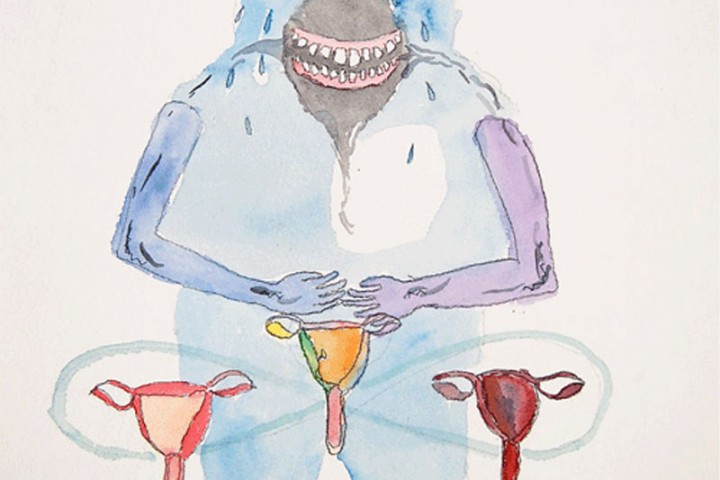Book review
Getting off: Pornography and the End of Masculinity

Getting Off: Pornography and the End of Masculinity
By Robert Jensen
South End Press, 2007
In Getting Off: Pornography and the End of Masculinity, Robert Jensen asks readers to look unflinchingly at contemporary, mainstream, heterosexual pornography and reflect honestly on what it says about the culture we live in. Jensen argues that porn represents a masculinity so toxic that conforming to it requires men to sacrifice their very humanity. He points out that as mainstream pornography has become more degrading towards women, it has simultaneously become increasingly normalized in our society, a paradox that leads to his conclusion that we live in a “rape culture.” He is careful to clarify, “That doesn’t mean the culture openly endorses rape, but it does endorse a vision of masculinity that makes rape inviting.”
What Jensen proposes as a solution is a tall order: essentially, he calls for the total elimination of gender, specifically asking men to follow his lead and renounce their manhood in order to reclaim their humanity. He challenges men to begin this process on a personal level by ending their participation in the sex industry and in all violent and controlling behaviour and relationships, by never supporting other men who “batter, rape and abuse,” by always offering whatever support can be accepted by those being abused, and by adopting a healthy sense of guilt (which he differentiates from shame as “the recognition that one has done a bad thing” versus “the feeling that one is bad” [169]). What he promises in return is the possibility of a transformed sexuality that moves from “pleasure” to “joy,” from “heat” to “light” and from “magic” to “mystery,” and which has the potential for an intimacy based in love, compassion and solidarity.
Positioning himself within a radical feminist framework, Jensen challenges those working or claiming to work against gender injustice (and all other intersecting forms of oppression) to make feminism more threatening, not less, and calls for a radical approach to getting to the root of one of the key sites of gender oppression: sexuality. He makes his argument against porn by offering readers a deeply personal reflection on his own evolving relationship with pornography, a theoretical analysis of the content, production and consumption of mainstream porn, a sampling of commentary from within the industry, and description after graphic description of deeply disturbing scenes from popular porn films, with his own commentary added.
Aspects of the gender-free utopia that Jensen envisions are inviting, and the deep personal conviction and honesty that he brings to Getting Off is admirable. Mainstream pornography does offer difficult but important insights into the misogyny of our culture, and men and women alike would do well to heed his request to enter into honest conversation about the issues it raises, painful though they might be. However, I question both his conclusions and his approach.
Getting Off is likely not a book that will achieve the widespread cultural awakening Jensen seeks, simply because both his arguments and tactics will alienate most readers. In his attempt to shock readers out of their complacency by forcing them to face the misogyny reflected in the worst aspects of pornography, Jensen leaves little room for the off-screen realities of complicated, contradictory, conflicted sexuality. While I certainly agree that the content, production and consumption of mainstream pornography is in large part degrading, and while I support unequivocally Jensen’s condemnation of violence towards women, I have difficulty embracing his leap from mainstream-porn-being-deeply-problematic to gender-being-an-inherently-harmful-construct. As a woman, I think it’s possible for me to identify with aspects of femininity without being a traitor to gender justice, to appreciate the idea of a nice ass without having to feel guilty for the objectification-or to fantasize about something naughty without perpetuating a culture that hates women and children. And I think it’s possible for men to indulge in the same without shame (or guilt) and to still take full responsibility for their roles in a systemically oppressive culture.
Unfortunately, although Jensen is careful to include token acknowledgment of the complexities of sexuality throughout, Getting Off leaves virtually no emotional space for us to actually be complicated or contradictory. Instead, Jensen dismisses the relevance of any alternative approaches to creating sexually explicit film and doesn’t hesitate to lump pro-sex feminist pornographers and sex educators in with his representation of a monolithic and universally hellish sex industry. For example, at one point Jensen quotes “someone in the industry” talking about how to play out a controversial fantasy safely and then interjects that, “In other words, it’s fine to want to treat a woman as less than fully human and to find sexual pleasure in it, but please do it in a way that’s hygienic.” What he chooses not to mention is that the woman he quotes is a feminist sex educator and pornographer who is writing an advice column for consenting adults acting out fantasies in private life. The omission is reminiscent of Michael Moore at his worst: by presenting only the portion of the context that best supports his argument, Jensen risks compromising the integrity of his analysis for the sake of horrifying his audience. The result was that I felt manipulated by his tactics rather than convinced by his analysis.
My other major criticism of Getting Off is Jensen’s tendency to speak on behalf of female sex workers. While their bodies feature prominently in Jensen’s descriptions of the debasement women undergo at the hands of the industry, their voices are conspicuously absent from the discussion. Although he provides a convincing analysis of the many factors that complicate women’s decisions to work in the sex industry, which he uses to dismiss the “freedom” of their choices to enter this line of work, his arguments would have been so much more compelling had he supported them by allowing women on the front lines of the issue to speak for themselves.
Instead, subtle value judgments run throughout his descriptions of women’s performances (“she seems to be in pain” [64], “she looks as if she might pass out” [62], “for a moment, her face changes; it is difficult to read her emotions, but it appears she may cry” [89]). As effective a technique as this is in terms of engaging the emotions of the reader, I find it troubling that a radical pro-feminist man would choose to base his argument on his own interpretation of the physical and emotional well-being of women onscreen to the exclusion of speaking to the women themselves.
Getting Off is unquestionably an important book that raises vital questions for those willing to look. But ultimately, Jensen’s “I know it’s not fair, but you asked” shock tactics and fundamentalist renderings of gender and sexuality made reading it an act of will. Only the most fearless (or masochistic) will be able to finish Getting Off-sadly, those who would benefit most from questioning their participation in mainstream pornography will likely not be the ones to rise to the challenge that Jensen presents.
Readers like you keep Briarpatch alive and thriving. Subscribe today to support fiercely independent journalism.








3 Comments
Social engineering will never die, I guess, no matter how many times it fails or is simply untried. It’s too exciting to humanities-types to project their own wishes upon the populace and find them wanting.
Only an academic could believe that ‘masculinity’ could be eradicated, that we could be become beings so abstract and formal.
Should ‘femininity’ be likewise excised? Retaining love and joy sounds like the answer would be no, in practice, if not in theory.
We are animals. We live and love and compete in a space that has other animals in an ecology fraught with scarcity. This will always evoke feelings of fear, happiness, and rage.
No amount of therapy, volition, insight, or conversation can undue this basic context of struggle. Since Freud it’s been a 100 years. No end in sight to misery, yet.
There has to be a place for such unacceptable impulses. They will come out here or there. Pretending that the blank slate is true at this point in the social sciences is just intellectual malpractice. There are demonstrable differences between the sexes, which needn’t be hyped as insurmountable to make my point, either.
It’s always odd to see academics, who prize their nuanced learning, advocate positions that are starkly, embarrassingly black and white in the most puritanical way.
There’s just no way to take his analysis seriously, and I’m tired of theorists spinning yarns who don’t have the analytic chops to demonstrate their conclusions.
Just because a man watches or enjoys porn doesn’t mean that he will act on this in his regular life. Does Jensen offer evidence of this?
Has anyone ever tried to attain this neutered nirvana and reported back to the rest of us on what it was like? Has he?
Real life is so much more complex than radical gender theorists like Jensen can even begin to comprehend. Polymorophous perversity has real, numinous power over us. It’s vibrant, epic, confusing, ephemeral.
In psychotherapy it is a commonplace that one cannot have good or desirable feelings without being able to have unpleasant ones. It sounds like Jensen is trying to somehow imagine away all the nasty and brutish parts of man, as if this kind of psychic surgery could be done.
This misses the core lesson of psychotherapy, if we have learned anything! You can’t cherry pick feelings, thoughts, attractions, lusts, desires, or appetites any more than you can any other fact of the outer world. They’re all equally real and needing of respect.
I used to think that these radical types were cool, avant garde. Now I see that so many postmodernists are poseurs, they are impervious to evidence and have the simplest of worldviews. Porn is bad, women are good. Men are brutes, women are victims.
A real dialectic is maddeningly ambiguous. Enchanting, potent, seductive. He’s a shill for sex as vapid as the religious right sees it.
From xxx on Apr 1st, 2008 at 11:00pm
So the criticism is that the book is shocking? Ooooh where can I pick up a copy?
Personally, I suspect the real criticism is that he makes any connection at all between the rampant misogyny in our culture and porn. We’re supposed to pretend that men actually care about women, but the rampant misogyny kinda throws a wrench in that idea, so let’s pretend that liberation equals pornification, shall we?
From Jade on Apr 2nd, 2008 at 6:07pm
to jade
ever try reading the material before rendering your viewpoint?
kinda weak and worthless
From mikael on Nov 28th, 2010 at 1:10am